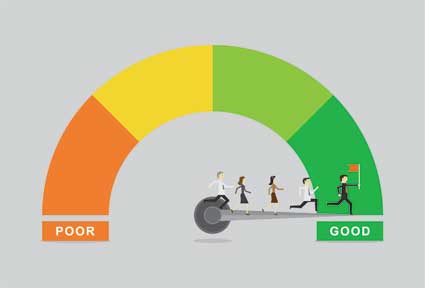Stress is a normal experience that everyone faces in their daily lives and it's easy for a person to think of a point in time where stress caused them problems. In small doses, people don't think too much about what causes their stress or the effects it has on them because it's such an ordinary thing. When it's in large doses, however, you can't help but notice what it does to you.
In business, stress can be a serious problem. In a 2012 APA study, around 65% of Americans identified the jobs as their primary source of stress, which seems to match with claims by experts.1 The situation has gotten so bad in recent years that employers have begun to take notice and take action to improve things for their employees. However that doesn't mean that stress has been completely removed from the business world.
This article will cover the impact of stress on organizational behavior and how businesses can properly manage it. This is applicable not only to business leaders and owners, but to their employees and management teams. Additional topics include identifying causes of stress, how to prevent it, and how to relieve stress at work in a healthy manner. It should be noted that the information in this article can be used in a person's personal life, not just their professional one.
The Science of Stress
The response in natural and is necessary for daily activities, albeit in small, brief dosages. It's when the hormones remain at abnormal levels for extended periods of time that stress can be cause of problem. Some of the more common responses to stress include:
- Changes in Eating Habits-The hormone fluctuation tends to impact a person's appetite, often resulting in them being less hungry.4 In some cases, they may be hungry at different times than usually or have cravings for unhealthy food when their appetite does return. This can lead to further health issues for a person if they are unable to reduce their stress levels over time.
- Cardiovascular Problems-As mentioned, stress raises a person's heart rate and blood pressure. Outside of exercise and physical activity, prolonged high cardiovascular functions are not a good thing and can lead to some serious effects like a heart attack or stroke.5
- Difficulty Sleeping-Since stress triggers the fight-or-flight response, the body will actively avoid actions that may make it vulnerable to threats. This can include sleep. A stressed person is often too wound up to relax and may find that it's harder for them to fall and/or stay asleep. Strangely enough, a person may also experience tiredness or fatigue due to stress and yet still be unable to sleep well enough to alleviate those symptoms.
- Shifts in Mood-Due to the fluctuation of hormone levels and as a byproduct of some of the effects listed here, a psychological effect from stress is not unusual. Typically, this develops as changes in mood, sometimes without provocation or warning. A person may become angry or frustrated, noticeably upset, and may exhibit signs of anxiety or depression due to stress.
- Weight Changes-Cortisol has multiple other functions that are not stress-related, one of which is the production and retention of fat in the body. It is not uncommon for a person gain or loose weight without any conscious attempts to do so when they are stressed.6 This can be a byproduct of any changes in eating habits that present themselves, as the body will increase fat storage to make up for the lack of energy that comes with not eating regularly.
Prolonged or chronic stress, which is common in working environments, can also affect any existing health conditions a person may have. Heart disease, diabetes, immune disorders, ulcers, asthma, and neurological conditions can all be worsened through exposure to stress.7
Interested in learning more? Why not take an online Organizational Behavior in Business course?What Impact Does Stress Have?
While it's been established that stress has a rather significant impact on a person's health and well-being, it can also have a significant impact on multiple aspects of business. The impact of stress will most likely affect more than just the person who is stressed, including their peers, supervisor, and anyone else they interact with at work. This can greatly disrupt the business' organizational behavior and the work conditions, especially if multiple employees are stressed out and possibly venting their frustrations on each other.
Other work-related side effects caused by employee stress can include:
- Performance and Quality-Stress take a lot of energy from a person, so it's not surprising that they are unable to do their best when they are stressed out. When a person is stressed, it's harder to concentrate on things and their ability to properly manage their time is severely impacted.8 Tight deadlines or unreasonable expectations can cause a person to stress even more and prompt a person to cut corners in an effort to get a task done on time.
- Turnover-In a global 2007-2008 report, around 40% of workers surveyed stated that stress was their primary reason for quitting their job.9 Toxic company culture and an overwhelming amount of work can increase stress levels significantly. Not only does it cut down their motivation, but it can be difficult for these stressed employees to get any relief due to their workload. In many cases, issues of stress in the workplace can be one of the many problems that turnover rates can tell employers about their business.
- Poor Management and Organization-Stress at work affects everyone, not just the employees on the ground floor. Those in management are most likely being exposed to the same stress triggers as their employees are and it's most likely going to affect their own performance. If a business has sloppy organization and management, it can cause more frustration for employees.10 In a way, this can generate an endless cycle of stress and disorder in a business and do far more harm than an isolated case would.
- Injuries and Violence-Yes, violence. Stress can cause people to do some really nasty things and that can include taking out their frustrations on others. Studies have shown that work-related stress has lead homicide to be the second highest cause of death in the workplace and has prompted nearly a million non-fatal accidents and crimes per year at work.11 It's not all physical violence either, as cases of verbal abuse like yelling are increasingly common and not always reported. As stress also tends to be distracting, people have become careless and injured themselves to too high stress levels at work.
How To Identify Causes Of Stress
Most of the time, employee stress is actually caused by their work. There is also the possibility that the causes of their stress could be found in their personal life, but stressor found at work would significantly amplify its effects. To determine what in a business is causing employee stress, managers and employers will have to look at the components of the business itself. They may also want to talk with their employees and get feedback.
- Policies-Strict rules or an abundance of policies can present to employees like the business is trying to micromanage them.12 Trying to adhere to the rules while at work can cause stress, especially if violations are treated severely. Any restrictions that company policies have may also inhibit employees' ability to destress at work, which will only allow their stress to continue to build. It should be noted that the effect that policies have on employee stress can be aided by overly strict or hostile managers who are enforcing them.
- Workload or Conditions-Heavy workloads or unfair working conditions will certainly cause some problems for employees that may lead them to become stressed out. A hostile or poor work environment can put undue strain on employees' performance, especially when its combined with long hours, few breaks, and pressure.13 The complexity of a task or the amount of work an employee has to do at work can also generate a stressful environment.
- Specific Staff Members-Everyone has, at least once in their life, encountered a peer that they just could not get along with or stand to work with. This is often the case when teamwork fails, as specific members can be antagonistic towards others. They may not even be aware that they are frustrating their co-workers, although there are some people who intentionally aggravate others to cause drama. The tension these staff members can cause widespread stress in a business through their interactions.
- Organizational Behavior-Strangely enough, stress affecting organizational behavior can be caused by organizational behavior. Usually, this applies to other components of the concept that may not be up to par with the rest or that may be impinging on the health of the workplace. Poor handling of organizational behavior can generate a stressful environment for employees.
Preventing Stress
The measures that employers take to prevent stress in the workplace will depend on aspects of the business (location, size, etc.) and what causes of stress they have identified. Some prevention measures that may work can include:
- Removal of Stressors-If possible, try to remove some of the more severe causes of stress. This may mean re-evaluating things like policies and the business environment to identify specifics, and possibly replacing necessary components where needed.
- Adjustments-For things that can't be completely removed, like policies and workloads, making adjustments instead to reduce the amount of stress they cause can help. An example would be modifying the schedule to better accommodate things like breaks and employees' abilities to complete an assignment.
- Offer Relief-Since you cannot completely wipe out all causes of stress in the workplace, it's best that employers consider providing options for their employees to relieve their stress. Some methods, like those mentioned later in this article, can be easily done while they work or during their break. Many stress relief tactics come at little to no financial cost and are readily available, so it's not a difficult thing to do.
- Re-Organize Staff-This is specifically when there is a human element behind the cause of employee stress. Reorganizing the staff members can separate employees who don't get along and prompt a re-evaluation of staff behavior. In some cases, training or additional instruction for people who may be inadvertently causing stress for their peers can help them adjust their behavior so it is work-appropriate.
Relieving Stress In A Healthy Way
There are a lot of ways a person can relieve stress, and not all of them are good for you. Choosing a healthy method of stress relief can do a better job of reducing stress and keep it from coming back. There are also some relief methods that are not so easily feasible at work, depending on your schedule. However, here are some ways to safely relief stress at work.
- Breathe-One of the first things that a stressed person should do is take a couple deep breaths to calm their respiratory and cardiovascular systems and to calm their mind.14 It can easily be done right at your desk without interrupting too much of your work time. Experts recommend breathing techniques like yoga breathing or the 4-7-8 method-inhale through the nose for four seconds, hold for seven seconds, then exhale through the mouth for eight, and repeat the sequence 3-4 times.15
- Distract Yourself-Items like stress balls or fidget devices work great for stress relief because it redirects your focus away from the stressor. These things are small and can be kept at a person's desk or in their pocket. If employers allow it, things like listening to music while you work can help as well, as there are songs that have a soothing effect on the listener.
- Talk To Someone-Venting to someone you trust can be a great way to uncork the build-up that stress causes. Choose someone you trust and do so when they are not currently occupied-you might inadvertently stress them out in the process. Talking to someone can also be an authority figure in the business; if there is something specific in your work environment that is causing stress, management may be able to handle it (i.e. removing it, etc.).
- Take A Walk-If you are able too, step away from your work for a few minutes and take a walk. This can simply be a walk around the block (let someone know first!) or throughout the building the business is in.16 Not only will this give you the chance to stretch your legs and get some exercise, but it will give you time away from stressors and give you time to calm yourself down.


























